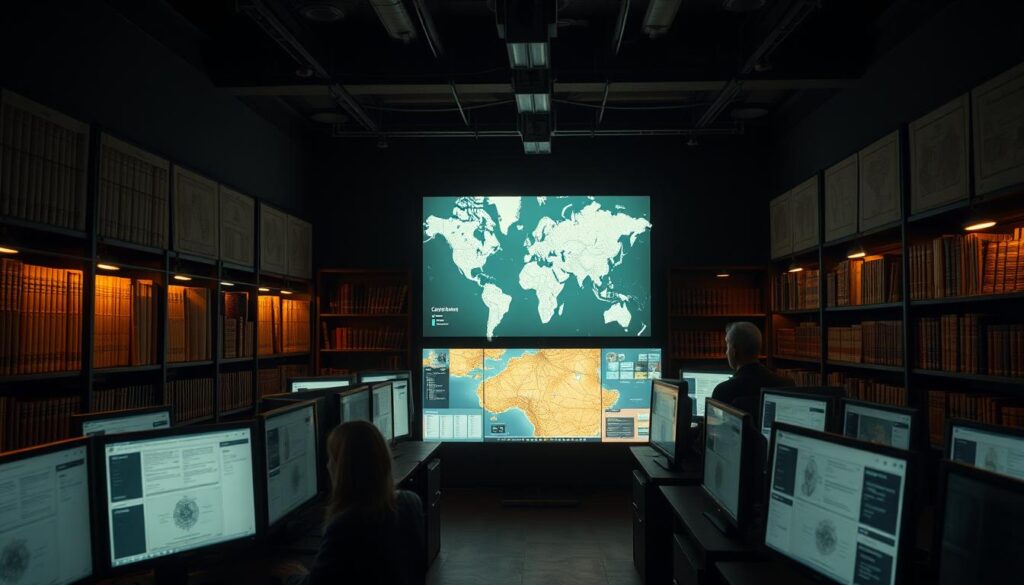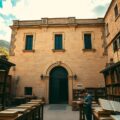Uncovering Calabrian roots is a personal journey for many Italian-Americans. Calabria’s coastal towns, ancient ruins, and cuisine attract people to explore their history. This quest can stir excitement, curiosity, and even a bit of nervousness.
Calabria genealogy research can be both rewarding and challenging. Millions of Italian immigrant descendants live outside Italy today. From 1880 to 1920, many Calabrians left their homeland for new opportunities abroad.
Understanding Italian immigration patterns is crucial. Calabrians often sailed from Naples and Palermo to Brazil, Argentina, USA, Venezuela, and Canada. Some even returned to Italy within a few years.
Tracing your Calabrian family tree requires navigating various records. These include passport applications, military conscriptions, church records, and civil registrations. Each document holds a piece of your family’s puzzle.
FamilySearch, a free service, is digitizing many Italian records online. This makes research easier for those seeking their Calabrian ancestry.
Calabrian heritage tracing can be an emotional journey. You may uncover stories of triumph, tragedy, love, and loss. These tales reveal the resilience of your ancestors.
Embrace this journey and connect with fellow researchers. Let the rich tapestry of your Calabrian roots inspire you.
Understanding Calabrian Heritage
Calabria, a region in Southern Italy, boasts a rich history and cultural legacy. These traditions have shaped generations of Italian immigrants in America. Between 1876 and 1930, nearly 5 million Italians entered American ports seeking better opportunities.
Calabrian heritage dates back thousands of years. Evidence of Homo Erectus presence along coastal areas goes back to 700,000 BC. The Greeks settled in Calabria around 1500 BC, introducing vine cultivation.
This rich history has created unique cultural traditions that define Calabrian ancestry. Many Italian-Americans find exploring their Calabrian roots deeply emotional. Phillip Infelise, with 100% Italian heritage, visited Piane Crati in Calabria with a heritage researcher.
“Discovering my Calabrian heritage has been a life-changing experience. It’s not just about tracing my family tree; it’s about connecting with the traditions, values, and culture that have shaped who I am today.” – Phillip Infelise
Calabrian traditions, like Sunday Gravy, remain popular among Italian-American families. This hearty tomato-based sauce is served with pasta and various meats. These culinary customs connect the past and present, preserving family history.
Getting Started with Your Family Research
Start your Calabrian family history journey by gathering information from relatives, documents, and photos. Focus on your ancestor’s town of origin. This detail is crucial for accessing Italian records.
Before 1860, people identified themselves by their regional or village identity. This was more common than national identity. Keep this in mind during your research.
Understanding Calabria’s history is key to finding your Italian ancestors. The region faced peasants’ revolts and heavy taxes. These events influenced migration patterns and shaped various record types.
“Italians to America” is a valuable resource for unindexed passenger list records. It covers arrivals at U.S. ports from 1880 to 1899. A new database of New York arrivals will soon be available at Ellis Island.
“The past is never dead. It’s not even past.” – William Faulkner
Southern Italians named children after grandparents and parents in a specific order. This pattern can help trace family lineages. Naturalization records may reveal arrival dates and ship names.
Utilizing Government Resources
Italian government resources offer vital information for ancestry research. Civil records like birth, marriage, and death certificates are crucial. These are kept in municipalities or provincial state archives across Italy.
Researchers can request civil records or visit offices in person. Due to privacy laws, records are available 70 years after creation. Church records may provide information dating back to the 16th century.
Censuses offer insights into household makeup and occupations. They’re conducted periodically. For Italian migrants, databases like CISEI provide access to millions of records.
“Exploring the vast array of government resources available can help piece together your family history and connect you with your Italian heritage.”
Document availability varies across State and Diocesan Archives. Some may require reservations or charge fees. Certain municipalities have specific rules for accessing historical documents.
Always check local procedures before visiting archives. This ensures a smooth research experience.
Exploring Online Genealogy Platforms
Italian genealogy websites make tracing Calabrian roots easier than ever. These platforms offer a wealth of information about Calabrian ancestry. Many provide access to digitized civil and church records.

Ancestry is a popular site with an extensive collection of Italian records. It’s a key resource for the 80 million Italian descendants worldwide. FamilySearch, a free platform, also offers many Italian records for beginners.
The Italian State Archives’ Antenati portal is crucial for Calabrian ancestry research. It provides access to many digitized civil and church records from Calabria. Researchers can explore their family history in depth here.
The Italian government has committed $20 million to genealogical initiatives. This is for the 2024 “Year of the Italian Roots in the World”. More records are expected to become available online soon.
“Discovering your Calabrian heritage is a journey that connects you to your ancestors and the rich history of Southern Italy.”
Online platforms have made Calabrian ancestry research more accessible. However, not all records are available online. Some platforms may require a subscription to access certain records.
It’s important to explore multiple resources when conducting your research. This approach ensures you gather the most comprehensive information about your Calabrian roots.
Connecting with Calabrian Communities
Tracing Calabrian roots can be deeply rewarding. Connecting with Italian genealogy societies and heritage groups provides invaluable support. These communities offer guidance, resources, and help in overcoming research obstacles.
The Italian Genealogical Group (IGG) maintains extensive databases and hosts events on Italian genealogy. Joining such groups opens doors to valuable information and expertise. Many Italian-American descendants actively preserve their cultural heritage in areas like Utica, NY.
“Connecting with fellow Calabrian descendants has been a game-changer in my research. Their insights and shared experiences have helped me piece together my family’s story in ways I never could have alone.” – Maria, genealogy enthusiast
Online communities of Calabrian heritage seekers are fantastic resources. Facebook hosts groups dedicated to tracing Calabrian roots. Members share tips and collaborate on research efforts.
These virtual networks show a strong desire to uncover ancestral connections. Exploring your Calabrian heritage enriches personal understanding and celebrates Calabria’s historical significance.
Conducting DNA Testing
DNA testing is a popular tool for uncovering Calabrian ancestry. Companies like Ancestry, 23andMe, and MyHeritage offer autosomal DNA tests. These tests identify genetic matches and estimate Italian heritage.
Autosomal tests analyze DNA across all ancestral lines. They help you discover relatives who share common ancestors. This can be valuable for connecting with distant family members.
Y-DNA tests examine the Y chromosome, passed from father to son. Mitochondrial DNA tests look at DNA inherited from your mother’s side. These tests help trace paternal and maternal lineages respectively.
Specific genetic markers may narrow down your ancestor’s Calabrian town of origin. This can be especially helpful when traditional records are incomplete or missing.
Genetic genealogy complements traditional research methods. Combining DNA results with historical records provides a comprehensive understanding of Calabrian heritage. It can also help break through genealogical brick walls.
“DNA testing has opened up a whole new world for those researching their Calabrian roots. It’s like having a GPS for your family tree, guiding you towards new discoveries and long-lost relatives.”
Choose a reputable company with a large user database for DNA testing. This increases your chances of finding meaningful matches. Be prepared for surprises that may reshape your understanding of Calabrian heritage.
Visiting Calabria
A Calabrian genealogy trip can be life-changing for those uncovering family roots. Calabria offers many chances to research Italian archives and explore ancestral towns. Personalized tours let you dive into your ancestors’ rich history and culture.
Book your trip well in advance to secure accommodations and services. Some clients book 18 months early, while others arrange trips just days before. For group travel, longer planning time ensures a smooth experience.
Your Calabrian journey lets you explore church and civil records. These include marriages, baptisms, births, and deaths. Local guides and translators can help with your research and communication needs.
They offer personalized itineraries based on your specific requirements. This ensures you get the most out of your ancestral quest.
“Visiting the town where my grandparents grew up and seeing the church where they were married was an emotional and unforgettable experience. The local guide helped me connect with distant relatives I never knew I had, and I left with a deeper understanding of my family’s history.” – Maria, Calabrian genealogy trip participant
Savor Calabria’s flavors during your trip. Many tours include meals at local trattorias with wine tasting. Enjoy three-course lunches overlooking the stunning Tyrrhenian Sea.
These experiences connect you with your ancestors’ culinary traditions. You’ll also enjoy Calabria’s breathtaking beauty while exploring your roots.
You might even meet living relatives during your ancestral town visits. Guides often succeed in arranging these emotional reunions. These meetings create lasting memories and strengthen family bonds across generations.
Documenting Your Findings
Organizing your Calabrian heritage research is vital. Create a Calabrian family tree to visualize ancestor relationships. This helps identify gaps in your research and understand family connections.
Use genealogy software to store records and photos. These tools make sharing and collaborating with relatives easy. Always include sources like civil registration, church records, or census data.

Preserving family history is crucial in genealogy research. Create a family history book with stories, photos, and important documents. Develop a website to share discoveries and connect with distant relatives.
“Every family has a story to tell, and it’s up to us to ensure that these stories are preserved for future generations.”
Organizing Italian genealogy research is an ongoing process. Keep updating your records as you uncover new information. Refine your Calabrian family tree regularly.
Dedicate time to preserving your family history. Your efforts create a valuable legacy for future generations to cherish.
Preserving Family History
Safeguarding your Calabrian heritage is crucial for future generations. Collect old photos, documents, and heirlooms to keep ancestors’ stories alive. These mementos offer a glimpse into their lives, connecting you to your roots.
Recording oral histories from older relatives preserves your family’s legacy. Their accounts bring life to names and dates on your family tree. You’ll gain insight into your ancestors’ challenges, triumphs, and sacrifices.
“Our Italian-American heritage is a treasure trove of stories, traditions, and values that have shaped who we are today. By sharing these ancestral stories with our children and grandchildren, we ensure that the legacy of our Calabrian ancestors lives on.”
Honor your Calabrian heritage by sharing traditions with younger generations. Gather for Sunday dinners, celebrate feast days, and pass down family recipes. These rituals bridge the past and present, fostering pride in your Italian-American identity.
Genealogy tourism interest is growing among 80 million people of Italian origin. Documenting your findings preserves Calabrian family history. Your efforts contribute to the Italian-American community’s collective memory.
Overcoming Common Challenges
Tracing your Calabrian family tree is exciting, but can be challenging. Italian genealogy brick walls include language barriers and record accessibility. With the right tools, you can uncover your family’s rich history.
Familiarize yourself with basic Italian genealogical terms and phrases. This knowledge helps when translating documents and communicating with local researchers. Collaborate with Calabrian genealogy experts to navigate Italian records.
When facing brick walls, explore alternative record sources. Census records, church registers, and civil records provide clues about your ancestors’ lives. Online genealogy databases and forums connect you with other researchers.
“The most important thing is to never give up. Every brick wall has a door.” – Donna Przeworski, Genealogist
Translating Italian documents can be difficult, but tools are available. Online translation services offer rough translations. Specialized genealogy translation services provide more accurate, context-specific translations.
These resources help unlock secrets in your ancestors’ records. You’ll gain a deeper understanding of their lives and history.
Continuing Your Research Journey
Advancing your Italian genealogy skills is an ongoing process. Attend workshops and webinars to learn from experienced researchers. Stay updated on the latest tools and techniques.
Collaborate with distant cousins for valuable insights and help with research barriers. Join online forums and social media groups dedicated to Calabrian genealogy. Connect with others who share your passion for family history.
Support fellow researchers by giving back to the genealogy community. Share your knowledge through online databases, articles, or volunteering at local societies. Helping others trace their roots expands your network and makes a positive impact.
About 4 million Italian Americans have roots in Southern Italy, including Calabria. This creates a growing demand for genealogical resources. Your family history is part of a larger story of Calabrian migration.
Calabria’s rich history spans from Stone Age settlements to mass emigration. Your personal journey connects to centuries of human experience. Embrace the challenges and joys of researching your Calabrian ancestry.
Each discovery brings you closer to understanding your family’s unique story. Patience, persistence, and learning are key to unlocking your past. These qualities help forge meaningful connections with your Calabrian heritage.





Leave a Reply